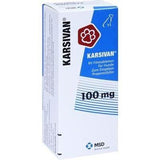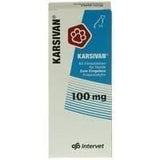KARSIVAN for dogs 100 film-coated tab. propentofylline dogs
Pack size: 60 pcs
Karsivan® 100 Vet film-coated tablets
For animals: dogs.
Active ingredient: propentofylline.
KARSIVAN for dogs 100 film-coated tab. propentofylline dogs Areas of application:
Circulatory disorders in the cerebral and peripheral area.
KARSIVAN for dogs 100 film-coated tab. propentofylline dogs Note:
Specific organ diseases (eg heart failure) are primarily to be treated causally. If under the application there is no improvement of matched with the blood circulation disorders associated symptoms, treatment varies depending on the type of disease in time, but not later than 4 weeks, cancel>.
Contraindications:
apply due to lack of studies not in pregnant females and breeding animals.
Side effects:
In rare cases, allergic skin reactions (e.g. urticaria) may occur after the administration of Karsivan, which makes it necessary to discontinue the treatment. In very rare cases, abdominal pain, loss of appetite, vomiting, diarrhea, ataxia, hyperactivity, shortness of breath, tachycardia and collapse can occur.
Warning noticeFor information on risks and side effects, read the package insert and ask your veterinarian or pharmacist.
KARSIVAN for dogs 100 film-coated tab. propentofylline dogs Active ingredients
- 100 mg propentofylline
Auxiliary materials
- Lactose-1 water
- Cornstarch
- talc
- Crospovidone
- Magnesium stearate
- Silica, finely divided
- Hypromellose
- Macrogol 8000
- Titanium dioxide
- Ferric oxide hydrate, black
Vasotherapeutic, geriatric, for dogs
KARSIVAN for dogs 100 film-coated tab. propentofylline dogs Composition:
1 film-coated tablet contains: Propentofylline 100 mg
Indications:
Circulatory disorders in the cerebral and peripheral area.
Note:
Specific organ diseases (e.g. heart failure) are primarily to be treated causally. If there is no improvement in the symptoms associated with the circulatory disorders during use, the treatment must be discontinued in good time, depending on the type of illness, but no later than after 4 weeks.
Contraindications:
Do not use on animals used for the production of food.
Precautions for use:
No information.
Interactions with other agents:
None known.
Warnings:
No information.
KARSIVAN for dogs 100 film-coated tab. propentofylline dogs Dosage instructions, type and duration of application:
For administration with the food:
Unless otherwise prescribed, dogs receive 3 mg propentofylline per kg body mass (BM) twice a day.
The following dosage schedule results for Karsivan® 100 mg:
Dogs receive: twice a day:
| KM |
Number of film- coated tablets Karsivan 100 mg |
| 9-15 kg | 1/2 |
| 16 - 32 kg | 1 |
| 33 - 50 kg | 1 1/2 |
If the kidney function is significantly reduced, the dose should be reduced.
The film-coated tablets can be put in directly or hidden in a food ball or mixed with food for independent consumption. Karsivan® is to be administered daily.
Advice in case of overdose:
No information.
Side effects:
Allergic skin diseases (e.g. urticaria) may rarely occur after the administration of Karsivan®, which makes it necessary to discontinue the treatment.
In very rare cases, abdominal pain, loss of appetite, vomiting, diarrhea, ataxia, hyperactivity, shortness of breath, tachycardia and collapse can occur.
Waiting time:
Not applicable.
Storage instructions:
This medicinal product does not require any special storage precautions.
Do not use the medicine after the expiry date stated on the container and outer packaging.
KARSIVAN for dogs 100 film-coated tab. propentofylline dogs Additional Information:
Pharmacological studies on the effect of the preparation on rats, dogs, cats, rabbits and monkeys showed a clear improvement in the microcirculation in the heart area, in the brain and in the skeletal muscles. Furthermore, it has been shown that the flow properties of the blood are favored and the oxygen supply in the peripheral and cerebral areas is increased. When examining this effect in the clinical trial, propentofylline was mainly used in older dogs with symptoms such as sluggishness, tiredness, apathy, stiff gait, difficulty getting up and walking, poor appetite, emaciation, hair loss, and dull coat. There were indications of an improvement in these complaints.
Depending on the symptoms of the disease, the effect can already set in after a few days.
Propentofylline proved to be well tolerated when administered daily to dogs for one year in the uppermost range of the intended dose. Vomiting and a tendency to changes in the red blood count were only found at a greatly increased dose.




